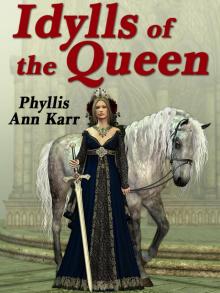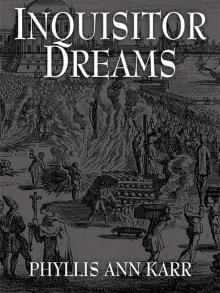- Home
- Phyllis Ann Karr
The Idylls of the Queen Page 23
The Idylls of the Queen Read online
Page 23
“Rather stiff punishment, for an offense as light as you make it out to have been,” I remarked.
“So does Heaven punish the sins of Its servants in this life, in order to free them from all punishment in the next. But my uncle, King Pellam, was maimed with the same weapon which had touched the heart’s blood of Our Lord Ihesu Himself—the highest honor even in the chastisement. Nor did Balin go unpunished for his sins, his pride and impiety. When he touched the sacred relic, the earth quaked and part of the castle fell about him. His wanton woman perished there, as Balin himself would have perished had not the Devil’s son Merlin come to save him for a worse punishment: killing and killed at the hands of his own brother, Sir Balan. So did God, for Balin’s sins, make him Heaven’s instrument of vengeance, and thus allow him to compound his own guilt and bring down further retribution upon his own head, as He allowed the Philistines to triumph for a time over His chosen people for their purification, and afterwards destroyed the Philistines utterly for their greater sin.”
“And meanwhile,” said Mordred, “King Pellam’s folk were left with a blighted land, a maimed king, and a castle to be built up again around the Holy Relics.” He shook his head. “And Galahad the Pure was conceived to mend the mischief, as others of us were conceived to make new mischief—all, it seems, by Heaven’s design.”
“King Pellam’s design and his daughter Elaine’s had a little to do with Galahad’s conception, as well,” I said. As nearly as I understood the tale, the crippled busybody of Carbonek and his resident sorceress Dame Brisane had played the panders to bring Lancelot and Elaine together. According to other reports, also, Pellam’s feast of peace and friendship had been closed to any man who did not bring a wife or paramour—maybe to give Garlon the opportunity of finding more “lustful knights” to murder—and Garlon’s blood had been needed to heal a victim he had left merely wounded, which explained why Balin and his lady had lingered to “desecrate” the body by collecting blood, instead of making their escape while Pellam waited for his weapon. I had never met either Garlon or King Pellam, though what I heard of them made their brother Pellinore seem more than ever to have been the cream of that generation of the family. But I had known Balin for almost as earnest and well-meaning a young knight as Gawain himself, though a bit more quick-tempered. Frankly, little use as I had ever had for old Merlin and his symbolic babblings, I had even less use for Pinel’s version of the Dolorous Stroke, nor could I see that it told us anything of Pinel we had not known already. Since I was tired of his parabolic interpretations, all I said was, “You should lay aside your weapons and turn hermit right away, Sir Knight of Carbonek. Then you could explain everybody’s dreams and histories to your soul’s content.”
CHAPTER 28
The Practice Tourney at Astolat
“By my head, said Sir Mordred to the damosel, ye are greatly to blame so to rebuke [Sir La Cote Male Taile], for I warn you plainly he is a good knight, and I doubt not but he shall prove a noble knight; but as yet he may not yet sit sure on horseback, for he that shall be a good horseman it must come of usage and exercise. But when he cometh to the strokes of his sword he is then noble and mighty, and that saw Sir Bleoberis and Sir Palomides, for wit ye well they are wily men of arms, and anon they know when they see a young knight by his riding, how they are sure to give him a fall from his horse or a great buffet. But for the most part they will not light on foot with young knights, for they are wight and strongly armed. For in likewise Sir Launcelot du Lake, when he was first made knight, he was often put to the worse upon horseback, but ever upon foot he recovered his renown, and slew and defoiled many knights of the Round Table. And therefore the rebukes that Sir Launcelot did unto many knights causeth them that be men of prowess to beware; for often I have seen the old proved knights rebuked and slain by them that were but young beginners.”
—Malory IX, 4
We came to Astolat about midafternoon of the next day, it being the tenth day after Sir Patrise’s burial, and the day Mordred had appointed for the jolly gathering which he may or may not have expected he would live to see. We were the first to arrive. Our party alone, Mordred, myself, Beaumains and Pinel with our squires, and Dame Nimue with all her people, seemed to double the population of the place.
Sir Bernard the Honest, the Baron of Astolat, keeps a small manor with crumbling defense walls—folk sometimes call it a castle out of courtesy—and depends on the comparative poverty of his town and its closeness to both London and Camelot to guard him from enemy depredations and costly visitations of the court in its progresses. He put a good face on our unexpected appearance and, no doubt, would eventually have been able to lodge us all; but the size of our party, and the news that we expected four more pairs of noble knights with their squires to join us, had almost the same effect on him that a full courtly visitation might have had; and he did not argue when we proposed to set up our pavilions in the meadow between forest and fields rather than take rooms inside the manor itself. Eager to play the good host, however, Sir Bernard had two pavilions of his own brought out and pitched beside ours, one for himself and his sons, one for his daughter and her nurse.
We had Bernard’s sons, Tirre and Lavain, join our own squires and give them a hasty mock-tournament, to help round out their training and take the edge off our wait. Beaumains, Pelleas, Mordred, Pinel, and Sir Bernard formed the knights’ party: Gareth Beaumains and Pelleas being recognized as among the top half-dozen men of their arms in the world, each supposedly worth at least three or four ordinary champions. I fought with the five squires—Tirre, Lavain, Gillimer, Lovel, and Gareth’s Villiars. They needed a seasoned man in their ranks, and it was the better exercise for me. A couple of Bernard’s men-at-arms waited ready to come in if his old herald, Dame Nimue’s musician, and Pinel’s dwarf, acting as keepers of the field, judged that either party was too badly overmatched in the melee; but although Beaumains and Pelleas had pretty much their own way in the individual jousts, once we got to the mixed fighting the squires and I held our own against their party, for all their glowing reputation.
It took our thoughts off our present business, it worked away the afternoon, and it gave Sir Bernard’s offspring one of the thrilling days of their lives to date, especially since it was probably the closest thing to a real tournament Astolat would ever witness. The baron’s daughter Elaine, still young and almost smooth-chested, enjoyed it as much as did her brothers, or maybe more, since she took no bruises, sitting between her nurse and Dame Nimue, clapping her hands and cheering for Lavain, to whom she had given her second-best scarf as a favor.
The keepers of the field seemed about ready to call the action to its close in time for Vespers, when Gawain and Ywain arrived. At the moment, I had not quite recovered from one of Beaumains’ blows to the helm, and Gillimer had been put out of action for the day some time earlier by a blow from Pelleas that numbed his arm and gave him an excuse to shirk his duties for the rest of the evening, so our party was being bested just then. As I began to recover my wits and lift my blunted sword to go to the nearest squire’s assistance, I suddenly became aware that a fresh knight was bearing down on me. I had barely time to turn, bring round my weapon, and glimpse the lion rampant of Ywain’s shield before I was rolling on the ground, with Ywain leaping his horse over to avoid trampling me. By the time I could sit up, Gawain and Ywain had the field won for the squires’ party, Pelleas and his shield were no longer anywhere in evidence, and the keepers were shouting the end of the medley.
As I eventually got the matter sorted out, Gawain and Ywain had ridden in, weary from a day of searching for Lancelot (like the champions they were, they had been traveling fully armed and helmed), to find a small tourney in progress. They had realized it was friendly practice; however, counting four virgin white shields against six—as they supposed—blazoned ones, they had also realized it was untested young knights or raw squires against seasoned veterans, and decided to give the youngsters a hand. Since I was not actually strikin
g a blow at the moment, but apparently looking less dazed than I was feeling, Ywain had assumed from my blazoned shield that I was fighting with the other knights, and accordingly put me out of action before I could fall on the innocents again. Pelleas, meanwhile, recognizing Gawain’s crimson shield with its gold pentangle, had chosen to take offense that Gawain should dare enter a friendly combat on the side against his, and ridden from the field in a huff.
No one being seriously hurt, and the Astolat folk being unaware of the undercurrents between Gawain and Pelleas, we picked ourselves up, turned our horses over to the grooms, unarmed with the help of servants and ladies; I managed to kiss and forgive Ywain with more grace than I felt; and we all washed and went to Vespers and then to supper. Gawain and Pelleas were seated far enough from each other at meat, with enough folk between, to avert unpleasantness during the meal.
Supper over, we danced for a while, to prove we were less bruised and weary than we actually were, and listened to Dame Nimue’s minstrel and singing maidens, who knew songs and tales no other minstrels knew. Our host’s daughter, at least, loved the dancing, and those of us who did not follow the songs and tales with full attention kept our fidgeting to ourselves.
When we separated to go to our own pavilions, neither Agravain and Ironside nor Gaheris and Astamore had yet showed up.
“All right, it’s the evening of the tenth day,” I said to Mordred when we were alone. “Where are your brothers?”
“Pacing our borrowed pavilion will not bring them any the faster, Seneschal. I doubt we can look for them, now, before morning.”
“Agravain and Gaheris—the ones you should have had most influence over.”
Perhaps no outsider had stated the internal politics of the Orkney clan quite so boldly to Mordred’s face before, but he took it in stride. “You flatter me to say that the youngest holds sway over two of his considerably elder brothers. You also seem to credit me with a shade more influence over Gaheris than I actually possess. But if they choose to interpret ‘the tenth day’ somewhat loosely, shall we lose our sleep, as they probably are not? A simple family rendezvous, after all, lacks the sacredness of an appointment to meet for solemn battle.”
“The Queen’s trial is in four days.”
“And London can be reached from Astolat in one, even without Dame Nimue’s fast travel.” Mordred stretched out and pulled up the silken bedclothes Dame Nimue had lent us along with the pavilion. “Has no knight ever been late to an assignation before now?” he added.
“If Ironside or Astamore is the traitor, one of your brothers might be dead!”
“In that case, we will soon know the traitor by his deed. I will hope it is Astamore, as seems not unlikely. Gaheris goes too much his own way to be quite manageable, but Agravain makes a satisfactory ally.”
“A few days ago,” I said, “you tried to put all the blame for your slander against the Queen on Agravain. You said, as I recall, that he must have lied to you as well as to everyone else.”
Mordred opened his innocent blue eyes, which the afternoon’s tourney had left slightly bloodshot, and gazed up at me for a moment. “Can it be that we are mistaken, and it is the elder brother who has the evil influence over the younger? Perhaps Sir Ironside would do us all a favor by dispatching brother Agravain.”
I started to damn him, and decided to go and pace outside instead. With luck, he would be asleep by the time I got back.
Light and music were still coming from Nimue’s own pavilion, so I walked towards it. The flaps being open, I glanced in. The Dame of the Lake and her consort were not yet abed, but sitting side by side, his arm around her shoulders, listening to her minstrel pluck some soft melody in a minor key.
I stepped inside. The minstrel did not stop playing. Pelleas glanced up and said, “Rude actions as well as rude words, Sir Kay?”
“Will the flames be polite four days from now, Sir Gentle?” I said. “If you want to be private, close your damn tent-flaps and blow out your candles. I have something important to talk over with your wife. Do you trust her alone with me for a few moments outside?” Actually, I had nothing to talk over with her that could not have been said in front of Pelleas, but the thought of his moon-face hovering disinterested at the edges of our conference annoyed me.
He inclined his head, not politely. “Since I would be more than your match with my head and left side unarmed and my left hand bound behind my back, Seneschal, I trust you with her.”
Maybe Pelleas was not quite the slaggard wit he usually seemed. He had described, presumably on purpose to nettle me, the way Lancelot had fought Meliagrant when the latter charged Dame Guenever of sleeping with me. “With your other failings, I wouldn’t put you to such an excess disadvantage,” I said, “and I’m more afraid of Dame Nimue’s weapons that of yours.”
“Don’t be wearisome.” Nimue rose and came to the door, signing her minstrel, as she passed him, to keep on playing his music. “You must forgive my Pelleas,” she went on quietly to me as we stepped outside. “He’s out of sorts because of Sir Gawain.”
“He knew Gawain was going to be here.”
“Aye, but do we not all sometimes overestimate our ability to rule ourselves in the situations to come? This is not what you wished to speak of, however.”
“We still have two pairs of knights who should have been here today and aren’t.”
She nodded. “There are a hundred reasons why knights should come late to their appointments… but Gawain’s brothers are traveling in company with suspected traitors and enemies to their family.”
“I’m glad one other person here besides myself can think with some sense.”
“I do my best,” said Dame Nimue. “So you wish me to take Sir Mordred’s mementos of his brothers tomorrow and search for Sir Agravain and Sir Gaheris. Would—”
She broke off. Someone was approaching with a strong, healthy stride. Thinking I recognized the sound of his footfall, I turned for a look. Gawain’s gold and silver hair showed up well enough in the patch of light from the pavilion doorway. So did his crimson tunic with the famous green sash making a dark band across his chest.
CHAPTER 29
The Tale of Pelleas and Ettard
“And she stepped up softly and stole to his bed,
Caught up the curtain, and coyly crept in,
And settled herself full snug on the bedside,
And lounged there at length, to look for his waking.”
—Sir Gawaine and the Green Knight
“My lord,” Nimue said in a low voice, obviously not badly pleased, for her own part, to see him.
“My lady.” Coming up to us, he stopped and bowed. “I do not break in upon you?”
“You don’t break in upon an amorous tete-a-tete, Gawain, if that’s what you mean,” I said.
“Even so, I still envy you, Sir Kay. The Lady Nimue is known no less for her beauty and wit than for her virtue. Is your lord awake within, madame?”
“He is.” She lowered her voice still more. “But I would not try to make peace with him tonight, if I were you.”
Gawain smiled and produced one of his favorite catch-phrases. “What may man do but try? If you will excuse me now, I’ll leave you to your conversation.”
As if we were going to be able to finish our own conversation now. After bowing again to the Lady of the Lake, Gawain went into the pavilion to brave Pelleas. Nimue clutched my arm and we stood and listened. Inside, the minstrel went on plucking his harpstrings.
Pelleas’ voice: “This is the night for unwelcome intruders, it seems.”
Gawain’s: “I came to ask your pardon, good knight, for my offense this afternoon.”
Pelleas: “Oh. So at least you understand you did commit an offense this afternoon.”
Gawain: “Half unwittingly. In the rush and the excitement, I did not at once recognize your device.”
Pelleas: “How extraordinary. I knew yours at once.”
I muttered, “Pelleas and his shield were mix
ed up in the melee.” I would have gone in to say it to his face, but Nimue held me back.
“Hush!” she whispered. “The quarrel between them is far deeper than an afternoon’s mock-tourney.”
“We saw it was no more than a practice battle, for love,” Gawain was saying, in response to some statement Pelleas had made while Nimue and I were muttering.
“And you did not recognize even one of our shields?” Pelleas returned. “Of five shields, you did not recognize even one companion of the Round Table, and two of them your own born brothers?”
“Aye, we rode against our brothers of the Table, and we rode in without stopping to change our weapons for blunted ones,” confessed Gawain, “though, through God’s good grace, no injury was done. I hope at least you will forgive Ywain, whose offense was the lesser, following my lead. And if you do not find it in your heart to forgive me tonight, I pray you will tomorrow.”
“And thirty-three years ago?” said Pelleas. “Was it half unwittingly you betrayed me then? Or was I fair game to you then, not yet being a brother of the Round Table?”
“Ihesu!” I exclaimed. I broke away from Nimue and went in. “How in God’s Name should Gawain have recognized your shield, Pelleas? How often have you been around your King’s court these past thirty years, to expect people to remember your device? And as for brothers of the Table—”
“Churl to the last!” began Pelleas, and Gawain tried to catch my arm, but I shook them both off.
“As for brothers of the Table, you were willing enough to let me fight with the squires against you this afternoon. You call me churl? I forgave Ywain a greater offense than you had from Gawain this afternoon. And as for thirty-three years ago, isn’t it about time to let Dame Ettard sleep in peace? And stop that infernal twanging!” I added to the minstrel.

 The Gallows in the Greenwood
The Gallows in the Greenwood At Amberleaf Fair
At Amberleaf Fair Frostflower and Thorn
Frostflower and Thorn The Fanciers & Realizers MEGAPACK
The Fanciers & Realizers MEGAPACK All But a Pleasure
All But a Pleasure The Idylls of the Queen
The Idylls of the Queen Frostflower and Windbourne (Frostflower & Thorn)
Frostflower and Windbourne (Frostflower & Thorn) Inquisitor Dreams
Inquisitor Dreams